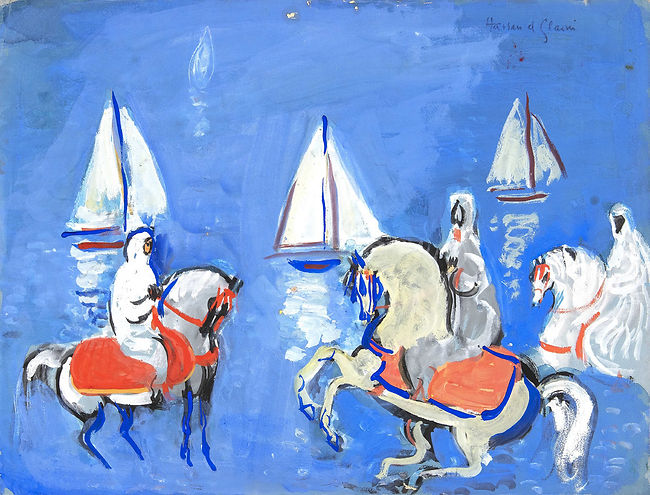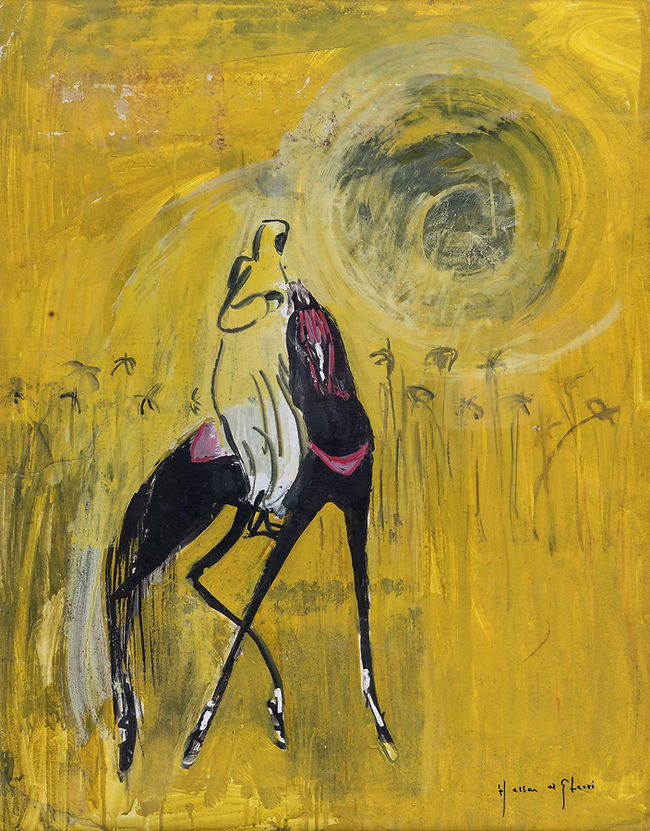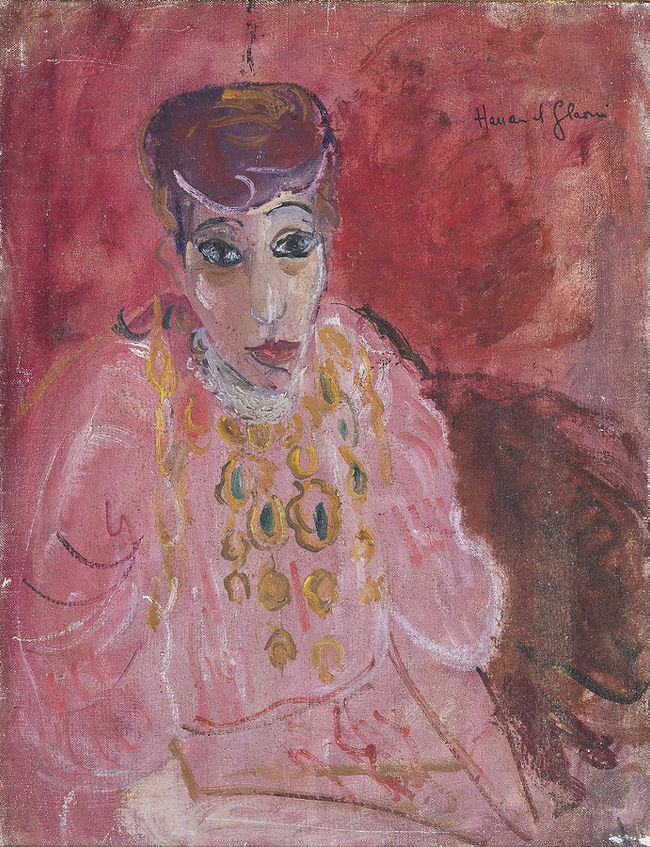THE COLLECTION
RETURN TO THE MAMOUNIA
A daughter recalls the artistic result of cross-cultural dialogue between a world statesman and the son of a warlord.
SAM BAYOUMI

Portrait of Hassan El Glaoui
The fascination artist Hassan El Glaoui (1924–2018) had for horses began at just seven years old when his father gave him and his brothers some pocket money. The other brothers spent theirs here and there on frivolous things. Hassan bought a horse. You might have thought his father would be very angry, but he felt it was an excellent investment. Besides, Hassan's father liked horses and had a whole stable full of them. What sort of father, you might wonder, gives his son enough pocket money to buy a horse? He was Thami El Glaoui, a tribal warlord who, with the backing of the French, ruled southern Morocco from a power base in Marrakech for most of the first half of the 20th century
Hassan's daughter, Touria, tells the story of the young boy and his horse, as she is the 45-year-old founding director of the 1-54 Contemporary African Art Fair, which takes place in London, New York, and Marrakech every year. She holds an MBA in Strategic Management and International Business from Pace University, New York and before 1-54 spent years working in banking, tech, and telecoms around the world. It's hard to connect this dressed-down, easy-going woman with a grandfather who, according to the May 20th, 1957 edition of Time magazine, ran a feudal empire, the revenues from which, “ranging from levies on Marrakech’s prostitutes to commissions on every commercial transaction in his domain, had made him rich beyond any man’s dreams.”

Hassan El Glaoui, Les Cavalier et Voiliers, non date. Collection de l’artiste
By the time of Touria's birth, the family wealth was gone - stripped away in the wake of Moroccan independence, when anyone who had been allied with the colonial French was punished for it. She grew up in a series of ”regular” houses in the Moroccan capital of Rabat, all of which would have: “A very nice area for my father's studio, which was always at the heart of the house. He always painted, as long as I remember."
Hassan El Glaoui’s love of painting went back almost as far as his love of horses. "But my grandfather was not supportive of his painting," says Touria. Help came from an unexpected quarter.

Hassan El Glaoui, Cavalier, 1977. Collection de l’artiste
Winston Churchill made his first visit to Morocco in 1935; it lasted six weeks, most of which he spent in Marrakech. He was captivated by the beauty of the country and was to return on numerous occasions, his last visit being in 1959. He favored La Mamounia hotel in Marrakech, where he would take up residence, amply provisioned with quantities of wine, spirits and Champagne, boxes of cigars, and his painting equipment. As well as being one of the most significant political figures of the modern age, a grand orator, and the author of numerous books of history, Churchill was also a gifted artist, and painting was his favorite pastime. "When I get to Heaven," he wrote, "I hope to spend the first million years painting." He was a regular dinner guest of Thami El Glaoui.
“The story was that Churchill saw a painting in my grandfather’s office,” says Touria, “and my grandfather told him, ‘don't know what to do with this son of mine, he just paints all day and all night.’ Churchill said he thought my father had talent, and painting was something he should pursue.”
The upshot was that, at the age of 26, Hassan El Glaoui was packed off to Paris, where he studied at the École des Beaux-Arts. On his return to a post-independence Morocco, he was able to get a job working in the office of King Hassan II. The two men played golf together, and the King became an admirer of Hassan's paintings, which frequently depicted the equestrian traditions of tribal Morocco.

Hassan El Glaoui, Houria, circa 1950. Collection de l’artiste
“Luckily for my dad, the King liked to make gifts of his artworks to official state guests, and we've got letters from President Bush, Mitterrand and Giscard D'Estaing thanking him for his paintings.”
At one point, Touria settled in Europe to be closer to her aging parents. She began acting on behalf of her father, dealing with the museums and galleries who wanted to exhibit his work, “getting involved in the legal stuff.” Today she is busy prepping for the upcoming year’s 1-54 Contemporary African Art Fairs which highlights work from artists and galleries across Africa.
Given her father’s example and her new-found passion for art, did she ever consider a career as an artist? “No, my father would never have stood for it,” says Touria. ‘You’re going to study something serious,’ he would have said.”

Upcoming Fairs:
1-54 New York, La Mamounia,
February 22-23,2020
1-54 London, The Caldwell Factory,
May 8-10, 2020
1-54 Marrakech, Somerset House,
October 8-11,2020


